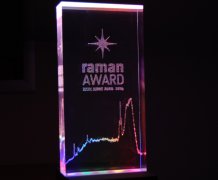
The inaugural Raman Award for the most Innovative Technological Development, won by Professor Nick Stone.
Exeter professor bestowed with major international award
A leading professor from the University of Exeter has secured a significant international award, in recognition of his pioneering research.
Professor Nick Stone was bestowed with the inaugural Raman Award for the most Innovative Technological Development, at the recent International Conference on Raman Spectroscopy held in Jena, Germany.
As well as the award, Professor Stone, who specialises in Biomedical Imaging and Biosensing, also received a 2,000 Euro prize.
Professor Stone was presented with the award for his work in developing novel in vivo diagnostic tools that utilise Raman spectroscopy to identify early disease from the molecular signals measured. Raman spectroscopy utilises the power of light to interrogate the molecular constituents of cells and tissues and how these change with disease progression. These approaches can be applied through needles, endoscopic probes or from the surface of the body.
Professor Stone’s research team are developing a set of clinical tools for various clinical applications, although the greatest focus has been on early cancer detection.
Speaking after the award ceremony, Professor Stone said: “I am absolutely thrilled to have received this honour; it is fantastic to have your work recognised by your peers.
“This conference is one of the biggest in the field, and to be shortlisted was quite some achievement. To win the award means a great deal, and is something I will cherish.”
Professor Ken Evans, Dean of the College of Engineering, Mathematics and Physical Sciences said: “We are immensely proud that Nick has won this award, which not only reflects his ability so positively on his ability as a scientist, but also highlights the major contribution his work is playing in the advancement of his field.
Professor Stone, a member of Exeter’s Physics and Astronomy department, holds a NIHR Career Scientist Research Fellowship and maintains an honorary position of Consultant Clinical Scientist within Gloucestershire Hospitals NHS Foundation Trust and the Royal Devon and Exeter NHS Foundation Trust. He leads Biomedical Spectroscopy exploring the use of novel vibrational spectroscopy and imaging for point of care testing and rapid in vivo diagnostics.
The International Conference on Raman Spectroscopy (ICORS) is the biggest international symposium for Raman Spectroscopy. It takes place every two years at alternating locations – in 2016 it will be in Brazil, previous events were in 2012 in Bangalore/India and in 2010 in Boston/USA. This year’s ICORS in Jena, Germany, was the biggest in the history of the conference.
Professor Dr Jürgen Popp, from the Friedrich Schiller University in Jena and who chaired the conference said: “We established the Raman Award in order to honour leading scientists for their outstanding achievements in the field of Raman Spectroscopy.”
Date: 18 September 2014
